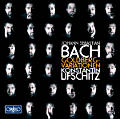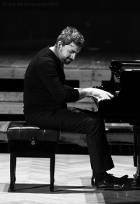ORFEO International – Reviews
Important Releases Briefly Introduced
February 2015
ORFEO 1 CD C 864 141 A
Johann Sebastian Bach - Goldberg-Variationen
This live recording is being released 20 years after Konstantin Lifschitz’s final concert at the Gnessin School. He played the Goldberg Variations there as part of his school-leaving exams at the age of 17, and performed it otherwise several times in concert at the time. 
C 864 141 AThis was back then still “unusual, even very, very daring”, and Lifschitz remembers how it seemed to him at the time that even the great Mrs Kantor (his teacher) was “almost envious” of him. Lifschitz himself has never missed an opportunity to try out the work on the organ or harpsichord, though he has never ever considered giving a public performance on one of those instruments. He has often performed the work in his piano recitals and has done so on all five continents. 
Konstantin Lifschitz
Foto: Sona AndreasyanWhereas there is a lack of a performing tradition for the Art of Fugue – especially on the piano – with the Goldberg Variations one runs far more obvious risks, such as an over-romanticisation of it, or playing it too drily. What is important to Lifschitz is an equilibrium of knowledge and freedom in performance. Whereas the Diabelli Variations have a quite different sense of progression, given their process of “shattering” and “cleansing” the theme, it is very different, says Lifschitz, with the Goldbergs. It is also important to Konstantin Lifschitz that Bach’s original title did not call his work “variations”, but “Veränderungen” (thus “changes” or “alterations”). The idea of a series of variations on a given theme, which in itself is so simple and obvious, is one that it seems Bach took up only with great hesitation – at least when one considers the rest of his extant oeuvre – however natural to him he might have found the compositional means that he employed in the work. But Konstantin Lifschitz feels one could also claim that Bach employs even more artfulness in hiding his skill from the listener, by distracting him with his manifold art of variation on many different levels. Today, one thing is more important to him than was the case when he made his studio recording, and in which he feels the live recording of his Würzburg concert released here comes closest to what he wants. What is indispensable to him is to integrate properly all the repeats of the individual variations.
top |